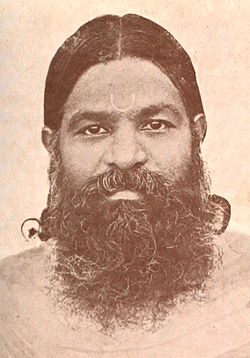Search results
Appearance
There is a page named "K. M. Balasubramaniam" on Wikipedia
- Tiru-k-Kural)Tamil Chandror Peravai. Zvelebil, K. (1962). Foreword. In: Tirukkural by Tiruvalluvar (Translated by K. M. Balasubramaniam). Madras: Manali Lakshmana Mudaliar...188 KB (19,361 words) - 03:28, 3 April 2025
- stars A. V. M. Rajan, Pushpalatha and Sheela. The soundtrack was composed by Vedha, while the lyrics were written by K. M. Balasubramaniam and Vaali. A...4 KB (235 words) - 21:11, 15 February 2025
- K. Pattammal and M. S. Subbulakshmi, are popularly referred to as the female trinity of Carnatic music. A prime disciple of G. N. Balasubramaniam, she...41 KB (1,774 words) - 08:47, 7 April 2025
- tradition, such as Somasundara Bharathiar and M. Rajamanickam, date the text to as early as 300 BCE. Historian K. K. Pillay assigned it to the early first-century...61 KB (6,916 words) - 20:22, 7 April 2025
- Sripathi Panditaradhyula Balasubramaniam)Retrieved 6 February 2019. "Kerala / Thiruvananthapuram News : S.P.Balasubramaniam shares memories with music buffs". The Hindu. 5 December 2005. Archived...61 KB (4,614 words) - 13:57, 17 March 2025Allen, & Co. p. 160. Zvelevil, K. (1962). Forward. Tirukkural by Tiruvalluvar. Translated by K. M. Balasubramaniam. Madras: Manali Lakshmana Mudaliar...47 KB (1,816 words) - 05:21, 27 February 2025Independent K. M. Balasubramaniam 1,898 1.41% New Independent C. Thiyagarajan 1,344 1.00% New Tamil Desiyak Katchi S. Suriamoorthy 1,242 0.92% New UCPI T. K. Gunasekaran...30 KB (505 words) - 14:46, 1 March 2025ISBN 978-8126053216. Zvelebil, K. (1962). Forward. Tirukkural by Tiruvalluvar. Translated by K. M. Balasubramaniam. Madras: Manali Lakshmana Mudaliar...9 KB (813 words) - 18:24, 8 August 2024ISBN 978-81-908000-2-0. Zvelevil, K. (1962). Forward. Tirukkural by Tiruvalluvar. Translated by K. M. Balasubramaniam. Madras: Manali Lakshmana Mudaliar...7 KB (799 words) - 19:44, 30 November 2024
- Impact of the Tirukkural (section K)1950–) "Thirukkural is a treatise par excellence on the art of living." (K. M. Munshi, Indian independence movement activist, politician, writer and educationist...39 KB (4,740 words) - 17:33, 3 January 2025
- with select specimens of their compositions. Ripley & Strong, printers. V. M. Gopalakrishnamachariyar (2009). திருக்குறள் மூலமும் பரிமேலழகர் உரையும் [Tirukkural:...13 KB (1,199 words) - 15:58, 28 October 2024
- question of language: Issue 6 of Congress political and economic studies. K. M. Ashraf. Guha 2008, pp. 128–131 Ghose, Sankar (1993). Jawaharlal Nehru, a...34 KB (3,552 words) - 03:23, 14 March 2025
- Mohini (1948 film) (category Films scored by S. M. Subbaiah Naidu)M. Somasundharam. It stars T. S. Balaiah, V. N. Janaki, Madhuri Devi, M. G. Ramachandran, Pulimoottai Ramaswami, M. N. Nambiar and R. Balasubramaniam...5 KB (267 words) - 21:49, 15 February 2025
- (1 ed.). Hyderabad: Orient Longman. pp. 392–393. ISBN 81-250-1453-5. George, K. M. (1973). Tirukkural and Malayalam. In: First All India Tirukkural Seminar...90 KB (2,429 words) - 22:48, 26 March 2025
- it stars M. K. Radha, Pushpavalli, Kumari Vanaja, Sriram, M. S. Sundari Bai, T. R. Ramachandran, D. Balasubramaniam, R. Balasubramaniam, K. N. Kamalam...9 KB (556 words) - 22:05, 15 February 2025
- L. Krishnan, was a music composer and a disciple of vocalist G.N. Balasubramaniam. Prakash began learning the mridangam at the age of nine and started...6 KB (445 words) - 16:46, 1 April 2025
- Porter V. V. S. Aiyar K. M. Balasubramaniam A. Chakravarti S. N. Srirama Desikan – also a translator of the work into Sanskrit S. M. Diaz V. R. Ramachandra...24 KB (2,235 words) - 05:30, 7 February 2025
- Devadasi (1948 film) (category Films scored by K. V. Mahadevan)Lal Tandon and T. V. Sundaram. The film stars Kannan, Leela, R. Balasubramaniam, and K. S. Angamuthu. The list was adapted from the review article in The...4 KB (319 words) - 21:15, 15 February 2025
- infection eventually leads to AIDS and, ultimately, death. Muthukumar Balasubramaniam, Jui Pandhare, and Chandravanu Dash; “Immune Control of HIV”, J Life









